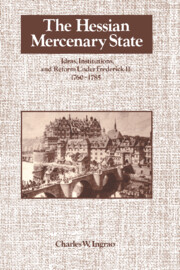Book contents
1 - Hesse-Cassel and the problem of enlightened absolutism
Published online by Cambridge University Press: 22 October 2009
Summary
And you betrayed people, oppressed, sold, humiliated by your fate: open your eyes, quit this country sullied by despotism, cross the ocean, flee to America. Embrace your brothers, defend that noble nation against the arrogant greed of its oppressors!
With these words Gabriele Riquetti, comte de Mirabeau, appealed to the Hessian people and their American expeditionary force to abandon the petty despotism of Landgrave Frederick II (1760–85). In the two centuries since, Hesse-Cassel and its ruler have retained a certain notoriety that has become a part of the popular mythology of the American Revolution. In the United States, historians have moved little from the image first projected by Mercy Otis Warren of the Hessians as “barbarous strangers” who committed atrocities against the American freedom fighters but were themselves the “slaves” of a typically greedy and corrupt European despot. Recent American scholars have been somewhat more sympathetic to the mercenaries themselves, portraying them as naive and oppressed peasants, “simple farming people” who were either unwilling or unknowing pawns of their sovereign. There has, however, been no revision in their view of the regime that first dispatched them to America. Until this century the landgrave's reputation has suffered from the Uriasbrief that he purportedly wrote to his field commander Baron Hohendorff, decrying the death of “only” 1,465 of his subjects at Trenton because the British paid him appreciably more for soldiers killed in action than for those who were merely wounded or captured, and suggesting that in the future his soldiers emulate the heroism of the Spartans who fought at Thermopylae.
- Type
- Chapter
- Information
- The Hessian Mercenary StateIdeas, Institutions, and Reform under Frederick II, 1760–1785, pp. 1 - 11Publisher: Cambridge University PressPrint publication year: 1986



